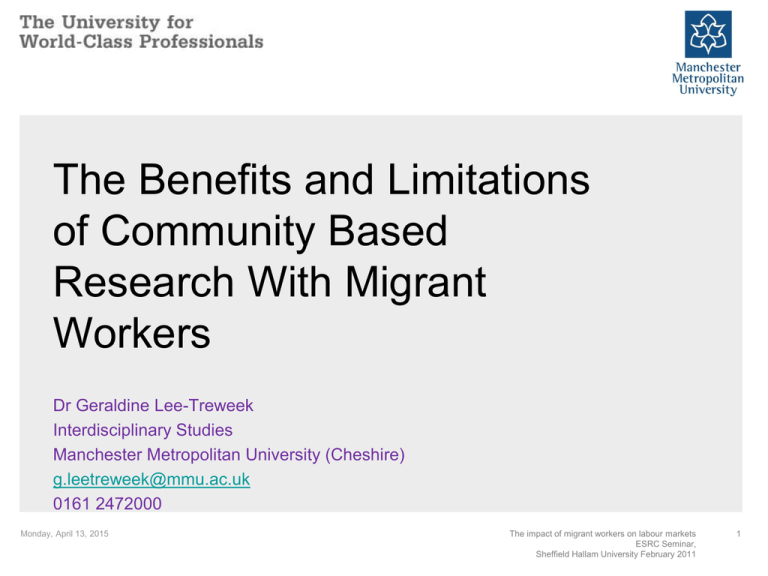The Benefits and Limitations of Community Based
advertisement

The Benefits and Limitations of Community Based Research With Migrant Workers Dr Geraldine Lee-Treweek Interdisciplinary Studies Manchester Metropolitan University (Cheshire) g.leetreweek@mmu.ac.uk 0161 2472000 Monday, April 13, 2015 The impact of migrant workers on labour markets ESRC Seminar, Sheffield Hallam University February 2011 1 Key Features of Community Based Research Approaches • encourage active participation of communities • Varying grades of research involvement • Serving a community’s interests, ‘whose side are you on?’ (Becker 1978) • engagement and impact - key drivers for growth in interest in CBR, PAR approaches. • Access to funding – more diverse funders, based on partnership working Monday, April 13, 2015 The Impact of migrant workers on labour markets ESRC Seminar Sheffield Hallam University 2 Key Features of Community Based Research Approaches (Continued) • Community capacity building, research, networks, understandings, reflexivity but also solutions • Social change and social activism • Qualitative and quantitative Framing Factors in HE research • “Stakeholder University” • Drive for research funding • Impact Monday, April 13, 2015 The Impact of migrant workers on labour markets ESRC Seminar Sheffield Hallam University, Feb 2011 3 Community Based Research in Crewe • • • • • Fertile place for study of migration Hefce funding to examine social regeneration Background and skills of Uni researchers Local competencies, co-researchers Research agenda – shifted to being provided by community themselves • Racism at work, problems within and between migrant groups, gender and work. Monday, April 13, 2015 The impact of migrant workers on labour markets ,ESRC seminar, Sheffield Hallam University February 2011 4 Benefits: • • • • • • Being able to access the so-called ‘hard to reach’ Ownership = engagement Getting inside the traditional accounts, Use of co-researchers benefits participants Frees data collection from usual time/uni constraints. Similar strengths to ethnographic inquiry Monday, April 13, 2015 Event Name and Venue 5 Interconnections • Work and community life • The ‘community’ is key to choices about work, knowledge of local labour market and to aspirations • Likewise, employers have understandings of communities • Some aspects of work can be rooted in community differentiation/s Monday, April 13, 2015 Event Name and Venue 6 Benefits, Continued • Facilitates trust relationships where trust has often broken down, there is social exclusion and generally liminal status of the study group • E.g. Examining forms of forced labour, secretive behaviour (anabolic steroid and illegal drug use), health and safety breaches at work, racism and sexism at work • Working with a mandate (of some form). • Sustainable research - Networking and Collaborative potential Monday, April 13, 2015 Event Name and Venue 7 Limitations: • Mandate – can be a double-edged sword • Who are ‘the community’, inclusion and exclusions • Getting tangled up in red tape: obstacles to working with communities due to stakeholders • Logistics – living the work and risk assessment/negotiation Monday, April 13, 2015 Event Name and Venue 8 Limitations, continued • Burn-out of staff – translators, researchers who are ‘of’ the community • “Atlas Effect” (DiPaolo and Lee-Treweek 2004 – paper available from the authors • • • • Risk to full time researchers – Community approaches as non-work/activism red listing Expectations and delivery of outcomes Monday, April 13, 2015 Event Name and Venue 9 Final Points • Community based research - Is it worth it? • Changing status • Growing importance of impact, voice, engagement • Personal satisfaction Monday, April 13, 2015 Event Name and Venue 10






